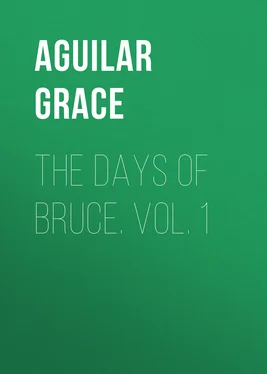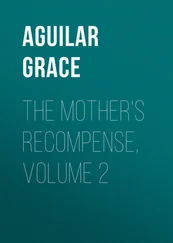Grace Aguilar - The Days of Bruce. Vol. 1
Здесь есть возможность читать онлайн «Grace Aguilar - The Days of Bruce. Vol. 1» — ознакомительный отрывок электронной книги совершенно бесплатно, а после прочтения отрывка купить полную версию. В некоторых случаях можно слушать аудио, скачать через торрент в формате fb2 и присутствует краткое содержание. Жанр: foreign_prose, История, foreign_edu, foreign_antique, на английском языке. Описание произведения, (предисловие) а так же отзывы посетителей доступны на портале библиотеки ЛибКат.
- Название:The Days of Bruce. Vol. 1
- Автор:
- Жанр:
- Год:неизвестен
- ISBN:нет данных
- Рейтинг книги:5 / 5. Голосов: 1
-
Избранное:Добавить в избранное
- Отзывы:
-
Ваша оценка:
- 100
- 1
- 2
- 3
- 4
- 5
The Days of Bruce. Vol. 1: краткое содержание, описание и аннотация
Предлагаем к чтению аннотацию, описание, краткое содержание или предисловие (зависит от того, что написал сам автор книги «The Days of Bruce. Vol. 1»). Если вы не нашли необходимую информацию о книге — напишите в комментариях, мы постараемся отыскать её.
The Days of Bruce. Vol. 1 — читать онлайн ознакомительный отрывок
Ниже представлен текст книги, разбитый по страницам. Система сохранения места последней прочитанной страницы, позволяет с удобством читать онлайн бесплатно книгу «The Days of Bruce. Vol. 1», без необходимости каждый раз заново искать на чём Вы остановились. Поставьте закладку, и сможете в любой момент перейти на страницу, на которой закончили чтение.
Интервал:
Закладка:
"Thou art over-scrupulous, my liege and brother, and I too hasty," replied Sir Edward Bruce, in the same bold, careless tone. "Yet beshrew me, but I think that in these times a sudden blow and hasty fate the only judgment for a traitor. The miscreant were too richly honored, that by thy royal hand he fell."
"My son, my son, I pray thee, peace," urged the abbot, in accents of calm, yet grave authority. "As minister of heaven, I may not list such words. Bend not thy brow in wrath, clad as thou art in mail, in youthful might; yet in my Maker's cause this withered frame is stronger yet than thou art. Enough of that which hath been. Thy sovereign spoke in lowly penitence to me—to me, who frail and lowly unto thee, am yet the minister of Him whom sin offends. To thee he stands a warrior and a king, who rude irreverence may brook not, even from his brother. Be peace between us, then, my son; an old man's blessing on thy fierce yet knightly spirit rest."
With a muttered oath Sir Edward had strode away at the abbot's first words, but the cloud passed from his brow as he concluded, and slightly, yet with something of reverence, he bowed his head.
"And whither didst thou wend thy way, my fiery brother?" demanded Robert. "Bringest thou aught of news, or didst thou and Douglas but set foot in stirrup and hand on rein simply from weariness of quiet?"
"In sober truth, 'twas even so; partly to mark the movements of the English, an they make a movement, which, till Pembroke come, they are all too much amazed to do; partly to see if in truth that poltroon Duncan of Fife yet hangs back and still persists in forswearing the loyalty of his ancestors, and leaving to better hands the proud task of placing the crown of Scotland on thy head."
"And thou art convinced at last that such and such only is his intention?" The knight nodded assent, and Bruce continued, jestingly, "And so thou mightst have been long ago, my sage brother, hadst thou listened to me. I tell thee Earl Duncan hath a spite against me, not for daring to raise the standard of freedom and proclaim myself a king, but for very hatred of myself. Nay, hast thou not seen it thyself, when, fellow-soldiers, fellow-seekers of the banquet, tournay, or ball, he hath avoided, shunned me? and why should he seek me now?"
"Why? does not Scotland call him, Scotland bid him gird his sword and don his mail? Will not the dim spectres of his loyal line start from their very tombs to call him to thy side, or brand him traitor and poltroon, with naught of Duff about him but the name? Thou smilest."
"At thy violence, good brother. Duncan of Fife loves better the silken cords of peace and pleasure, e'en though those silken threads hide chains, than the trumpet's voice and weight of mail. In England bred, courted, flattered by her king, 'twere much too sore a trouble to excite his anger and lose his favor; and for whom, for what?—to crown the man he hateth from his soul?"
"And knowest thou wherefore, good my son, in what thou hast offended?"
"Offended, holy father? Nay, in naught unless perchance a service rendered when a boy—a simple service, merely that of saving life—hath rendered him the touchy fool he is. But hark! who comes?"
The tramping of many horses, mingled with the eager voices of men, resounded from the courtyard as he spoke, and Sir Edward strode hastily to the casement. "Sir Robert Keith returned!" he exclaimed, joyfully; "and seemingly right well attended. Litters too—bah! we want no more women. 'Tis somewhat new for Keith to be a squire of dames. Why, what banner is this? The black bear of Buchan—impossible! the earl is a foul Comyn. I'll to the court, for this passes my poor wits." He turned hastily to quit the chamber, as a youth entered, not without some opposition, it appeared, from the attendants without, but eagerly he had burst through them, and flung his plumed helmet from his beautiful brow, and, after glancing hastily round the room, bounded to the side of Robert, knelt at his feet, and clasped his knees without uttering a syllable, voiceless from an emotion whose index was stamped upon his glowing features.
"Nigel, by all that's marvellous, and as moon-stricken as his wont! Why, where the foul fiend hast thou sprung from? Art dumb, thou foolish boy? By St. Andrew, these are times to act and speak, not think and feel! Whence comest thou?"
So spoke the impatient Edward, to whom the character of his youngest brother had ever been a riddle, which it had been too much trouble to expound, and that which it seemed to his too careless thought he ever looked upon with scorn and contempt. Not so, King Robert; he raised him affectionately in his arms, and pressed him to his heart.
"Thou'rt welcome, most, most welcome, Nigel; as welcome as unlooked for. But why this quick return from scenes and studies more congenial to thy gentle nature, my young brother? this fettered land is scarce a home for thee; thy free, thy fond imaginings can scarce have resting here." He spoke sadly, and his smile unwittingly was sorrowful.
"And thinkest thou, Robert—nay, forgive me, good my liege—thinkest thou, because I loved the poet's dream, because I turned, in sad and lonely musing, from King Edward's court, I loved the cloister better than the camp? Oh, do me not such wrong! thou knowest not the guidings of my heart; nor needs it now, my sword shall better plead my cause than can my tongue." He turned away deeply and evidently pained, and a half laugh from Sir Edward prevented the king's reply.
"Well crowed, my pretty fledgling," he said, half jesting, half in scorn. "But knowest thou, to fight in very earnest is something different than to read and chant it in a minstrel's lay? Better hie thee back to Florence, boy; the mail suit and crested helm are not for such as thee—better shun them now, than after they are donned."
"How! darest thou, Edward? Edward, tempt me not too far," exclaimed Nigel, his cheek flushing, and springing towards him, his hand upon his half-drawn sword. "By heaven, wert thou not my mother's son, I would compel thee to retract these words, injurious, unjust! How darest thou judge me coward, till my cowardice is proved? Thy blood is not more red than mine."
"Peace, peace! what meaneth this unseemly broil?" said Robert, hastily advancing between them, for the dark features of Edward were lowering in wrath, and Nigel was excited to unwonted fierceness. "Edward, begone! and as thou saidst, see to Sir Robert Keith—what news he brings. Nigel, on thy love, thy allegiance so lately proffered, if I read thy greeting right, I pray thee heed not his taunting words. I do not doubt thee; 'twas for thy happiness, not for thy gallantry, I trembled. Look not thus dejected;" he held out his hand, which his brother knelt to salute. "Nay, nay, thou foolish boy, forget my new dignity a while, and now that rude brawler has departed, tell me in sober wisdom, how camest thou here? How didst thou know I might have need of thee?" A quick blush suffused the cheek of the young man; he hesitated, evidently confused. "Why, what ails thee, boy? By St. Andrew, Nigel, I do believe thou hast never quitted Scotland."
"And if I have not, my lord, what wilt thou deem me?"
"A very strangely wayward boy, not knowing his own mind," replied the king, smiling. "Yet why should I say so? I never asked thy confidence, never sought it, or in any way returned or appreciated thy boyish love, and why should I deem thee wayward, never inquiring into thy projects—passing thee by, perchance, as a wild visionary, much happier than myself?"
"And thou wilt think me yet more a visionary, I fear me, Robert; yet thine interest is too dear to pass unanswered," rejoined Nigel, after glancing round and perceiving they were alone, for the abbot had departed with Sir Edward, seeking to tame his reckless spirit.
"Know, then, to aid me in keeping aloof from the tyrant of my country, whom instinctively I hated, I confined myself to books and such lore yet more than my natural inclination prompted, though that was strong enough—I had made a solemn vow, rather to take the monk's cowl and frock, than receive knighthood from the hand of Edward of England, or raise my sword at his bidding. My whole soul yearned towards the country of my fathers, that country which was theirs by royal right; and when the renown of Wallace reached my ears, when, in my waking and sleeping dreams, I beheld the patriot struggling for freedom, peace, the only one whose arm had struck for Scotland, whose tongue had dared to speak resistance, I longed wildly, intensely, vainly, to burst the thraldom which held my race, and seek for death beneath the patriot banner. I longed, yet dared not. My own death were welcome; but mother, father, brothers, sisters, all were perilled, had I done so. I stood, I deemed, alone in my enthusiast dreams; those I loved best, acknowledged, bowed before the man my very spirit loathed; and how dared I, a boy, a child, stand forth arraigning and condemning? But wherefore art thou thus, Robert? oh, what has thus moved thee?"
Читать дальшеИнтервал:
Закладка:
Похожие книги на «The Days of Bruce. Vol. 1»
Представляем Вашему вниманию похожие книги на «The Days of Bruce. Vol. 1» списком для выбора. Мы отобрали схожую по названию и смыслу литературу в надежде предоставить читателям больше вариантов отыскать новые, интересные, ещё непрочитанные произведения.
Обсуждение, отзывы о книге «The Days of Bruce. Vol. 1» и просто собственные мнения читателей. Оставьте ваши комментарии, напишите, что Вы думаете о произведении, его смысле или главных героях. Укажите что конкретно понравилось, а что нет, и почему Вы так считаете.












